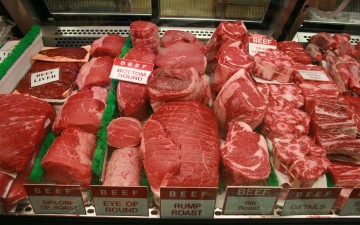See, we joked about this before, but when it shows up on my NBC News feed… tears need to be shed:
After years of research and weeks of buildup, taste testers on Monday finally bit into a burger created from stem cells in a culture dish rather than meat from a farm or a store.
The burger was cooked in front of reporters and taste-tested by Chicago-based author and food writer Josh Schonwald and Austrian food researcher Hanni Rutzler.
Although they struggled to decide whether they liked the taste, both were pleasantly surprised at the texture and juicyness given the absence of natural fats.
“It wasn’t unpleasant,” said Schonwald.
“There is quite some intense flavor,” Rutzler said, although she added that it needed seasoning. “The look was quite similar to meat. It has quite a bite.”
She added: “The surface of the meat was crunchy – surprisingly. The taste itself was as juicy as meat can be, but different. It tastes like meat, not a meat-substitute like soya or whatever.”
Monday’s high-profile tasting at West London’s Riverside Studios, broadcast online via streaming video, served as the public unveiling for a strain of “cultured beef” developed by University of Maastricht physiologist Mark Post. He declared the taste test a success.
“I’m very excited. It took a long time to get this far,” said Post. “I think this is a very good start. I’m very happy with it.”
[…]
The tasters said the burger was edible and had the texture of other meat but said more work was required to improve the taste.
“There is a leanness to it,” food writer Schonwald said. “The absence of fat is what makes it taste different.”
“I would say it is somewhere on the spectrum between a Boca Burger [soy burger brand] and McDonald’s,” he added. “The absence of fat makes a big difference. It has the texture, which I was not expecting. It was like an animal-protein cake.”
Post said he would not let a reporter or the chef the chance to taste a piece of the burger, saying there was not enough to go around.
He said technology was making it easier to identify which naturally-occurring ingredients could be used to improve the taste.
The burger was cooked by chef Richard McGeown.
“It cooked like any other burger I’ve cooked before, it seems to give off a pleasant aroma,” McGeown said. “It looks incredibly appetizing. I managed not to burn it.”
[source]
You know, I get it. I can respect what this is intending to do. The article goes on to explain more about food insecurity, and how finding a way to feed the world’s growing population with minimally adverse effects on the environment is ideal.
I totally get it.
None of this changes the fact that I have questions:
1) Will we receive notice when this starts being intermingled with the beef people are already buying? Will we pass regulations requiring manufacturers to affix a special label to products that contain the “cultured beef?” (Also: gotta laugh a little bit at “cultured beef.” Could you imagine the marketing spin? “Well-aged, cultured ground beef burger?”)
2) How does this beef compare to beef cut from an actual, live animal? How do the nutritional profiles compare? And, even as I ask that question, I have to acknowledge a very real reality: nutritional science is limited in what it knows about the biomechanics of nutrition – and, to that end, we don’t know what we don’t know. I’m all for exploration, but how long are we going to test this potential protein source out before we allow it to be released into the public?
3) I think it should also be noted that a lot of the reason that there’s a “beef crisis” is because of the overconsumption of beef by the U.S. If the market needs to be flooded with artificial beef, what is that beef going to be used for? It’s going to become the beef filler in processed food, right? What is this going to do for the food economy? Your random meat patty in your $1 TV dinners will contain this stuff, and the people who can afford to overconsume beef will continue to overconsume, but will up their quality so as to avoid this stuff… leaving this “cultured beef” relegated to people who couldn’t afford actual meat.
I’m not wearing a tinfoil hat, here – I’m just trying to understand what this could potentially do to the industry and economics as a whole.
More importantly, if there are nutritional concerns with the product, and it becomes “the beef of the poor,” does it wind up doing the same thing that processed food is doing, but at an exaggerated rate? Because, I’ve got to admit, I’d sooner give up meat altogether than eat this. I don’t even eat beef, and this has me concerned.
Why can’t we just encourage people to eat less? Oh, wait. Never mind.
What do you think? Am I off base, here? Would you welcome “cultured beef” into your home?
